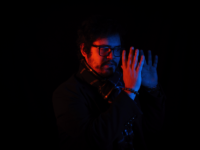Saxophonist Renato D’Aiello again teams up with bassist Nicola Muresu, plus a host of others, for his latest album on the 33Jazz label, Satori. The interplay between D’Aiello and Muresu is obvious from the first, as the opening “Angel” — a tale of love with strong vocals from Michael Demarco — includes two middle-section solos, the first from the sax of Renato, followed by a bass solo from Muresu.
“Giovanna’s Requiem” follows, fusing classical elements from a gorgeous arrangement of the theme for a string quartet which transitions into a slow ballad with bluesy tones and vocals from Renato D’Aiello, lifted more by a beautiful sax solo over which the violin soars. The theme is passed to piano and bass and then back to the sax. D’Aiello’s sax then plays with the theme, spinning it high into the rafters before the tune transcends back to the more formal structure of the quartet again – lovely. It’s cool jazz, but not so cool it leaves you cold. Far from it in, fact.
“Sea Goddess” is a rolling, lilting number, again transitioning between string dominated classical overtones and the blues/jazz rhythms of the band, foiled by a lovely double bass solo from Nicola Muresu and a piano section from Bruno Montrone which is fast and fiddly. That contrasts well with the backing of smooth, classy music from the rest of the musicians. This piece has strong structure and yet delicate beauty.
Burt Bacharach’s “Alfie” actually gets two outings on Satori, once as an instrumental on track 4 and once with vocals added by Deelee Dube. On the first version, Renato D’Aiello plays the theme on tenor sax, backed by the strings, and manages to get more emotion into the song than I have heard before. There is something slightly ethereal about Renato’s playing: He seems to be able to take a well-known theme and make it sound like something new and wondrous, because he feels the music. Half way through the song, he pulls a dextrous little improvisation around the theme out of the hat — making the repetitive theme different yet again. The interplay of stings and sax gives a cohesion and unity, which does Bacharach proud.
“I Wish” is a simple but engaging piece using all the musicians and the vocals of Jeff Otto. It is followed on Satori by “The Dreamer” which is an easy, lilting piece, enhanced by the strong backing of bass and drums and an expressive solo from D’Aiello which has a touch of raspiness and a sense free-flowing exploration which keeps the attention, a bass solo and a dextrous sax finish. “Alfie” is reprised as the final track on Satori, and the instrumental introduction is note-for-note identical to the instrumental version earlier — but then the vocal of Deelee Dubee introduces a husky, breathless quality which makes it a completely different number. Clear words, a lovely voice, beautiful instrumental backing and a soaring solo from D’Aiello’s sax make for a great summation to Satori.
Renato D’Aiello was born in Naples and studied saxophone with virtuoso sax player Antonio Andolfi, then with Sal Nistico (American tenor sax player with Woody Herman), Steve Grossman (who played with Miles Davis) and Tony Scott. D’Aiello started his professional career playing with Giovanni Tommaso’s Big Band for Pupi Avati’s TV program in 1986-87 and, in 1987, received a full tuition scholarship from Berklee in Boston. International tours followed in 1991 with Tony Scott and in 1992, 1993 and 1995 Renato toured Japan with the Yoshida Masahiro trio followed by European tours with trumpet/flugelhorn player Art Farmer and Rachel Gould in 1996/97.
His composition credits include music for an opera entitled Seven Red Doors by writer Oberto Airaudi and several co-productions for IRMA Records as sax player and producer. In 1999, Renato moved to the UK. For the past four years, Renato D’Aiello has led a regular Monday night session dubbed the Late Late Show at Ronnie Scott’s. During this time, he has worked extensively in Europe with major concerts in France, Italy, Germany, Spain and Finland in addition to performing at the Malta Jazz Festival. He has played with major players including Keith Copeland, Roland Prince, Jim Mullen, Claire Teal, Bruce Forman, Gene Calderazzo, Bruce Adams, Gilad Atzmon and Patrice Galas. He has played the Jazz Cafe, London, the Vortex, the Barbican Foyer, Wigmore Hall, the Crypt and Pizza Express in Dean Street among many other venues across the UK and Europe and played several major festivals.
In 2007, Renato D’Aiello released his first album Sintetico on 33Jazz, also featuring bassist Nicola Muresu as well as Andrea Pozza on piano and American drummer Keith Copeland. Earlier recordings include 2014’s Ballads, also 33Jazz; and The Invisible Session for Italy’s Schema Records.
Renato D’Aiello’s Satori makes good on the promise of those earlier recordings, with quality and experience woven through every track. Throughout, he shows his skills as composer, arranger and player= — composing all of the the tracks apart from “Alfie,” and all of the lyrics apart from “Alfie” and Jeff Otto’s “I Wish.” But it’s not a one-man show. There is clear communication going on between the musicians, vocalists and ultimately the listener. Satori surprised me in all the best ways good music can, and I warmed more to it with each play — and there have been many. Satori is listen-again music, and hopefully the first of many from this talented musician.
- Milena Casado – ‘Reflection of Another Self’ (2025) - May 4, 2025
- Luis Ianes and Noel Akchote – ‘Seuil’ (2025) - April 12, 2025
- David Dower Trio – ‘Sonder’ (2025) - March 23, 2025



